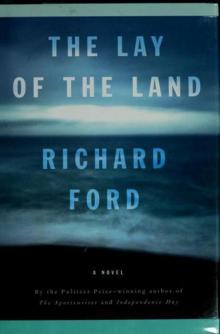Read The Lay of the Land Storyline:
After more than a decade, Richard Ford revives Frank Bascombe, the beloved protagonist from The Sportswriter and Independence Day. Fans will be scrambling for The Lay of the Land, a novel that finds Bascombe contending with health, marital, and familial issues wake of the 2000 presidential election. We asked Richard Ford to tell us a little more about what it's like to create (and share so much time with) a character like Frank. Read his short essay below. --Daphne Durham Richard Ford on Frank BascombeI never think of the characters I write as exactly people, the way some writers say they do, letting their characters "just take over and write the book;" or for that matter, in the way I want readers to think of them as people, or even as I think of characters in novels I myself read (and didn't write). In my own books I do all the writing--the characters don't. And for me to think of them as people, instead of as figures made of language, would make my characters less subject to the useful and necessary changes that occur as I grow in my own awareness about them as I make them up. Writing a character for twenty-five years and for three novels, as I have written about Frank Bascombe, has meant that Frank has, of course, become a presence in my life (and a welcome one). When I wrote Independence Day I began with the belief that Frank was pretty much the same character and presence he was in The Sportswriter. But when I went back later and read parts of The Sportswriter, I found that the sentences Frank "spoke" and that filled that second book were longer, more complex, and actually contained more nitty experience than the first book. This has also been true of The Lay of the Land: longer sentences, more experience to reconcile and transact, more words required to make lived life seem accessible. You could say that Frank had simply changed as we all do. But practically speaking--as his author--what this makes me think is that I've had to make up Frank up newly each time, and have not exactly "gone back" and "found" him--although Frank's history from the previous books has certainly needed to be kept in sight and made consistent. What is finally consistent to me about Frank is that I "hear" language I associate with him, and it is language that pleases me, with which I and he can (if I'm a good enough writer) represent life in an intelligent and hopeful and buoyant spirit a reader can make use of. --Richard FordPages of The Lay of the Land :
